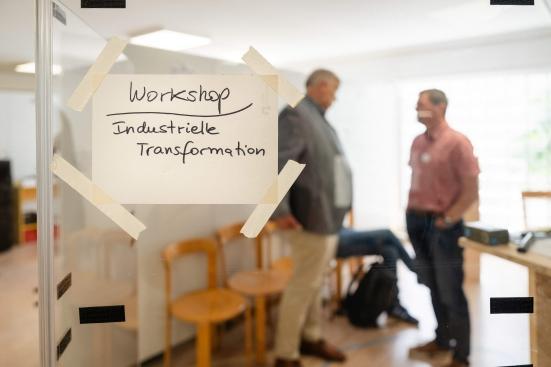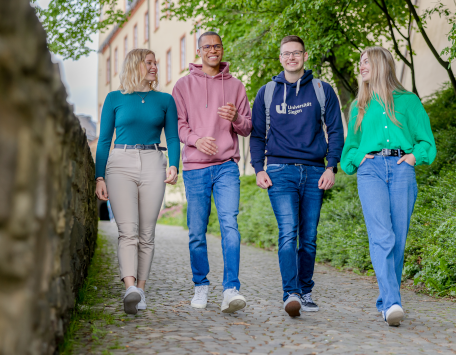FUSION project: Bringing change into social practice
Rural areas such as South Westphalia are at the center of major social changes: The climate crisis, digital transformation, shortage of skilled workers and a profound transformation of the economy and democratic society are shaping the present - and call for new, joint solutions. This is precisely where the University of Siegen's FUSION project comes in. The aim is to develop new perspectives for the transformation of rural areas and our region together with regional stakeholders from municipalities, institutions, companies, civil society and academia. The university is actively involved as a local partner - among other things, to gain a better understanding of the region's most pressing issues.
Research with the region - not about it
The "Innovative University" program of the Federal Ministry of Research, Technology and Space (BMFTR) is funding the project for cooperation between university and regional development over a period of five years. "Our aim is not only to analyze innovation processes in the region, but also to help shape them through joint research and constructive action. In this way, we want to bring changes into social practice," says Prof. Dr. Volker Wulf, FUSION project manager and Prorector for Science, Technology and Society at the University of Siegen. The project was launched in 2023 and will reach "half-time" in summer 2025.
Workshops for new impetus
What needs to change in South Westphalia to increase the region's future viability? What role can the University of Siegen play in this? The "FUSION FORUM" has now explored these questions. Prof. Dr. Martin Hill (DO-IT Südwestfalen), Jens Kamieth (MdL NRW), Dr. Thilo Pahl (IHK-Siegen), Prof. Dr. Klaus Pantke (HS Hamm - Lippstadt) and Marie Ting (Südwestfalen Agentur) spoke about the challenges in the region in a high-level panel discussion on the topic of "Development and change requirements in South Westphalia". "South Westphalia must remain a strong industrial region - and adapt to the new framework conditions. We need to develop energy-efficient and sustainable products, establish sustainable production structures and develop new business models," said Prof. Martin Hill.
Jens Kamieth emphasized the role of the university: "The university is a driving force and source of inspiration for the region. With Fusion, a project has been created that bundles the strengths of the university. Scientifically sound, based on partnership, strategically oriented. Fusion is therefore absolutely in tune with the times, connecting topics and people in an exemplary manner." IHK Managing Director Dr. Thilo Pahl saw the issue of skills shortages as particularly crucial: "The region that benefits from the transformation process will be the one that is most open to young people."
Marie Ting (Südwestfalen-Agentur) advocated a positive vision for the future: "It's about the attitude of the region, about its core positioning. A positive, strong, visual vision for South Westphalia has an impact in the region and radiates beyond."
Five workshops on key areas of action for regional transformation:
- Future prospects for companies in the region: among other things, this is about utilizing the potential of the circular economy in the industrial transformation. For example, by recycling old electric cars, which contain valuable non-ferrous metals and new types of composites and plastics.
- Health and social services in rural areas: services of general interest, gaps in provision and innovative approaches. Strengthening volunteering and community structures are central pillars - for example through "Social Days", on which employees are given time off for care work. More health literacy in everyday life is to be created through practice-oriented education. Both opportunities and challenges lie in the cooperation between different players in the healthcare system; overarching contact points can ensure better communication and cooperation.
- Studio Südwestfalen - cooperation between local authorities and the Department of Architecture: strengthening community, enabling diversity. One focus is on well-founded urban planning and open space-related analyses and designs by the university, which are made available to the municipalities as impulses and options for follow-up planning. Both the municipalities and the university benefit from this - through the creative, often unconventional approach and the direct engagement with real places, actors and processes. This creates an interplay between research, teaching and practice on site.
- Forest as a resource: sustainable use of regional resources, circular economy and climate protection. Hardwood is considered a resource for the future, and the focus should be on the long-term use and recycling of wood - e.g. by removing and reinstalling it. Research can provide important impetus here. Forests should also be used as recreational and protective forests in order to strengthen their role in tourism, biodiversity and climate adaptation.
- Decarbonization: research and application of hydrogen. Particularly in the field of mobility, saving energy and reducing CO2 emissions is a key issue that can be promoted by hydrogen.
The FUSION project is continuing its work in the second half in seven sub-projects. All information can be found here.








